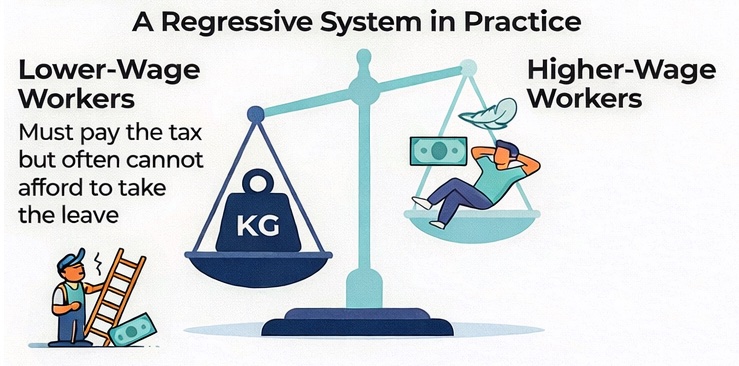Yesterday the U.S. Supreme Court handed down a landmark ruling in the case of Janus v. American Federation of State, County and Municipal Employees (AFSCME), ending forced unionization for more than seven million public sector employees. This means every worker at every level of government, in every state, now has the freedom to choose whether to give a portion of his or her paycheck to a government union.
The man behind the legal challenge, Illinois state employee Mark Janus, told the court the requirement that he pay dues or “agency fees” to a government union to keep his job violated his First Amendment rights. His legal argument was simple—everything his union does, including collectively bargaining with the government, is inherently political, because it pertains to public policy and involves spending taxpayer money. Therefore compelling him to fund that union is forced political speech and a violation of his constitutional rights.
The Court agreed:
“We conclude that this arrangement violates the free speech rights of nonmembers by compelling them to subsidize private speech on matters of substantial public concern.”
The ruling recognizes the constitutional freedom of association rights of workers in all levels of government and restores their power of personal choice. Those workers now have the right to decide for themselves whether to financially support a government union.
That alone is grounds for celebration. But the Court went even further:
“By agreeing to pay, nonmembers are waiving their First Amendment rights, and such a waiver cannot be presumed.”
Yep, that means in order to collect union dues from public workers, each worker has to opt in to paying those union dues, they can’t be required to opt out to stop that automatic collection from their paycheck:
“Neither an agency fee nor any other payment to the union may be deducted from a nonmember’s wages, nor may any other attempt be made to collect such a payment, unless the employee affirmatively consents to pay.”
This is a direct response to schemes we’ve seen in various states, including Washington, in anticipation of the Janus ruling where unions, aided by friendly state legislatures, have maneuvered to create a system where the burden is on workers to keep money from being taken from their paychecks and sent to the union.
Now, thanks to the Court’s Janus ruling such schemes are illegal, invalidating a law our state legislature passed earlier this year (at the request of government unions) setting up an opt out system for public employees. Under HB 2751, which went into effect earlier this month, every state worker was presumed to be a member of their union unless and until the worker took the proactive step of opting out. So the state needed no permission or authorization from a worker to take a portion of their paycheck and send it to the union. The Court explicitly says that authorization is, in fact, needed.
The impact of the Court’s ruling in the Janus case cannot be overstated.
Prior to the Janus ruling, public employees had no choice. They were forced to pay for government union activities and policies with which many disagree, and that sometimes run counter to their own economic interests. For these workers, the government union they must give part of their hard earned wages to every month does not represent their best interests or reflect their values.
This does not mean they are anti-union, or that unions are bad. It simply means unions are not a good fit for everyone.
Of course, many public workers are happy with their union. The Court’s ruling does not affect them in any way. The decision in favor of Mark Janus and a worker’s right to choose does not prohibit them from unionizing, nor does it bar a government union from collectively bargaining on their behalf. If you like your government union, you can keep it.
The ruling simply means those workers cannot be forced to pay a government union in order to get and keep a job. In other words, government unions will have to operate like every other business or voluntary organization. They must convince workers the services they provide are valuable and worth what the union charges.
Government union executives say the Janus case is about union busting. That’s just inflammatory rhetoric and fear mongering. Janus is about empowering public workers by restoring, and protecting, their right to freely choose whether they pay a government union for representation they do not want.
But the battle for worker rights is really just beginning. Rather than trying to convince workers of the value of their services, government unions are dreaming up ways to circumvent the ruling and prevent workers from exercising their rights. Government unions in our state, aided by the lawmakers they helped elect, have already built gauntlet of roadblocks designed to confuse workers and make it difficult for them to choose to quit paying their union. And it sounds like they’re not done.
After the Court’s invalidation of HB 2751 and its now illegal opt out system, the sponsor of the bill, Rep. Monica Stonier (D-Vancouver) responded yesterday that there are potential tweaks to her legislation that could make it legal, and that she is currently analyzing the Janus decision to see if there are other bills she could support that would bolster unions.
Senator Karen Keiser (D-Kent), who served as the Communications Director for the Washington State Labor Council for 25 years (while also serving in the legislature), said there will be more legislative help for public sector unions next year, promising, “there will be many new initiatives in 2019.”
There is no mention of any concern for bolstering the rights of public workers or helping them exercise those rights.
Governor Inslee and Attorney General Bob Ferguson are similarly worried about the impact on public sector unions, issuing a joint press statement lamenting the Court’s decision with a statement that some interpret as tacit approval should public workers “resort to enormously disruptive strikes and walk-outs in order to make their voices heard.” Never mind that it is illegal for state workers to strike in Washington.
Our state’s public workers deserve better.
Washington Policy Center doesn’t think anyone should be forced to pay someone else for the privilege of working. It’s a victory for worker freedom that the U.S. Supreme Court agrees. Now comes the daunting job of making sure all public employees understand their right to choose.





